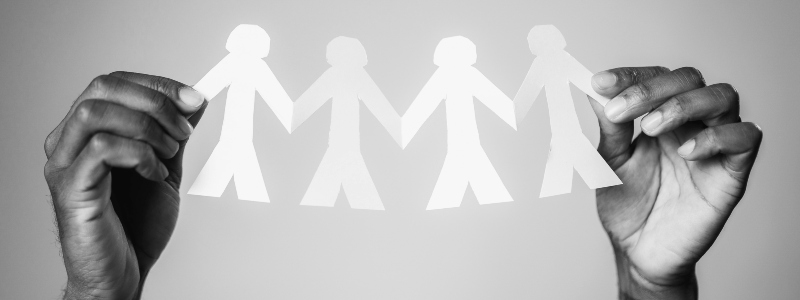It is notable that people seeking therapy who would most stand to benefit from joining a therapy group are often the least keen to do so.
For some people, difficulties with being part of a group are not the main reason they’re seeking therapy. However, the thought of being in a therapy group may be problematic enough for them to turn down the chance to join one, even if this is recommended as the most helpful therapy for their particular issues.
There are also those whose difficulties with being part of a group present major obstacles in their lives. They may be prevented from making relationships and leading fulfilled social and working lives. Of course, it is understandable that a therapy group may feel the last place they want to be. However, group psychotherapy is likely to have the best impact in helping them overcome their social problems.
Below, I want to put the case for why those who hate/dislike/can’t stand/fear groups might still consider one as a therapy of choice.
Problems with groups
Groups are difficult. By their nature, groups can stir up intense feelings, often in a raw and sometimes unsettling way. It is natural and normal to feel anxious or even frightened in a new group situation, particularly one where you feel unknown or alone.
Some people find these uncomfortable feelings to be intolerable, and they struggle to get beyond the negative experiences of being in a group. This means they miss out on the very positive experiences of being part of a group, whether social, friendship, work or otherwise. Groups can also be wonderful, creating strong feelings of connection and belonging.
Chronic problems with groups often arise out of social or relationship difficulties. Unfortunately, any tendency to try to avoid them generally exacerbates feelings of loneliness and isolation. Repeatedly not allowing yourself to experience groups can make them feel even more bewildering and frightening when, inevitably, you find yourself in one.
Stressors and underlying factors
Some people find that group problems can manifest in all situations. For others, specific types of groups or settings are difficult. One person may be fine in small social groups but highly anxious in larger parties. Another person may feel that the anonymity of a larger group is safer than the pressure of intimacy and being in the ‘spotlight’ in a smaller gathering. Some people are relaxed in social situations but find work groups problematic, and so on.
It can be helpful to locate and explore where the difficulty in the group may be for you. For example, it could be that you find groups most difficult when you’re just with your peers. Alternatively, perhaps peer groups are fine until an authority figure joins in. Maybe both situations feel hard? Or neither, but something else?
Some people find that their anxieties are particularly stirred when they don’t feel sure of their position or role in a group. It is normal for us to want to know our place in groups. However, the potential loss of identity in groups can lead some individuals to taking unhelpful roles to feel secure. Some examples of these include always being the helper or listener, being the clown, staying silent, keeping on the edge, or performing all the time.
These kinds of ‘roles’ can often be traced back to the original family and the position or role given or taken up by us as children. These roles perhaps help the individual feel less insecure in a group, but can come at a cost, particularly when they become rigid and restrictive.
An inhibiting feeling sometimes associated with groups is shame. This often relates to earlier experiences of becoming conscious of having a public and private self and how these were responded to by others. Many group difficulties can be located in early groups, like the family, and school. Some can be clearly remembered, for example, bullying at school, while others might be less so. Sometimes, painful feelings and experiences from past groups that have been partly or fully buried can suddenly surface in group situations and feel overwhelming.
How do therapy groups help?
Therapy groups are deliberately made to feel safe. This environment is created by having firm boundaries, confidentiality and a general commitment of all members to be supportive and helpful to each other. The experience of being in this kind of group can be reassuring if you usually find groups to be frightening, threatening, or potentially humiliating. Over time this can get absorbed and applied outside, so all group situations start to feel easier.
A therapy group can become like a laboratory for testing out and understanding the kinds of anxieties and feelings that certain group dynamics stir up. This allows you to become aware of how groups operate and how you respond. This can then be explored with the help of the other members in various ways.
Testing out new roles
As the group becomes a place where feelings and dynamics can be explored, it also becomes possible to test out other roles than those restrictive ones that have been taken in the past. So, for example, the ‘helper’ may be able to stand back and allow themselves to be helped. The ‘clown’ can be taken seriously. The silent member learns to use their voice. The person on the edge can be central at times, and the performer can give themselves a break. These shifts are connected to increased self-esteem as members realise they have value in all their aspects and a place in the group, whatever role they take up.
In conclusion
Most problems that bring people to therapy are, at root, connected to a difficulty at some point in their life with relationships. Very often, this includes earlier ones. It makes sense to explore these struggles through current relationships with others in the way that therapy groups allow and contain.
These are some examples of how therapy groups might help to develop a different experience of a group environment. A final point to make is that in our modern world, we have arguably become increasingly alienated from those around us. The therapy group places us firmly back in a social environment and reconnects us with each other. In this sense, it can potentially have therapeutic benefits for us all.
Claire Barnes is an experienced UKCP registered psychotherapist and group analyst offering psychodynamic counselling and psychotherapy to individuals and groups at our Hove practice.
Click here to listen to our podcast on this post.
Click here to download a PDF version of this post.


